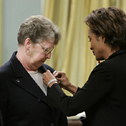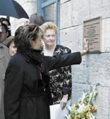Why we don’t need a Queen of Canada
May 2nd, 2006 | By Randall White | Category: Canadian Republic Mr. John Ibbitson is arguably the most stimulating and even brilliant political columnist in Ottawa today.
Mr. John Ibbitson is arguably the most stimulating and even brilliant political columnist in Ottawa today.
He is always worth reading, and often right.
But for growing numbers of the Canadian people he is just wrong in his recent Toronto Globe and Mail column on “Why we need a Queen of Canada.”
Electing the governor-general as a replacement for the British monarch as Canada’s symbolic head of state, Mr. Ibbitson says, raises a host of questions for which no one really has good answers. But consider, for example, two increasingly successful modern democracies of the forward-looking global village today – in Ireland and India.
Both places have shown how the office of governor-general in a former self-governing British dominion can be easily converted into an elected and independent ceremonial head of state. For more than half a century, both places have worked quite well as British-modeled parliamentary democracies, just like Canada today, with just such elected heads of state.
 In Ireland, the head of state is directly elected by the Irish people. But this is done via a nomination process that effectively keeps the directly elected Irish president in the modest role of a largely ceremonial head of state, very similar to the present governor-general of Canada.
In Ireland, the head of state is directly elected by the Irish people. But this is done via a nomination process that effectively keeps the directly elected Irish president in the modest role of a largely ceremonial head of state, very similar to the present governor-general of Canada.
In India, the head of state is indirectly elected by the popularly elected members of the federal and state legislatures or parliaments. Adapting this model to Canada would mean having the governor-general and future independent head of state chosen by the elected members of the federal parliament in Ottawa and the 10 provincial (and three territorial?) legislatures.
As Mr. Ibbitson’s fellow Globe and Mail columnist Jeffrey Simpson suggested when the excellent Michaelle Jean became governor-general last fall, perhaps a cross-country Citizens Assembly should be looking into the exact details of such a new selection method, in the quite near future.
Mr. Ibbitson has two further wobbly objections to the concept of a reformed office of governor-general as an independent democratic head of state for Canada. To start with here, he claims that there “is no realistic hope of amending the Constitution to replace the monarchy with the governor-general.”
 In fact, what Mr. Ibbitson calls “the House of Commons, the Senate,” and “10 provincial legislatures” already agreed to extensive constitutional amendments in the 1992 Charlottetown Accord. This, it is true, was subsequently defeated in a popular referendum. But, as far as the monarchy goes, an April 2005 opinion poll conducted by Ipsos-Reid for CTV and the Globe and Mail reported that 55% of Canadians already agree with the statement: “When Queen Elizabeth’s reign ends, Canada should end its formal ties to the British Monarchy.”
In fact, what Mr. Ibbitson calls “the House of Commons, the Senate,” and “10 provincial legislatures” already agreed to extensive constitutional amendments in the 1992 Charlottetown Accord. This, it is true, was subsequently defeated in a popular referendum. But, as far as the monarchy goes, an April 2005 opinion poll conducted by Ipsos-Reid for CTV and the Globe and Mail reported that 55% of Canadians already agree with the statement: “When Queen Elizabeth’s reign ends, Canada should end its formal ties to the British Monarchy.”
Mr. Ibbitson is certainly right that ever since the failure of the 1992 Charlottetown Accord, Canada has been in something of a constitutional logjam. But Prime Minister Harper has already indicated a refreshing willingness to ultimately re-visit this logjam – in some more constructive and pragmatic step-by-step style. Canada still has some unfinished constitutional business that it will have to deal with at some point, to ensure a strong and prosperous future in the 21st century.
Mr. Ibbitson concluded his recent column with “a final reason to preserve the monarchy” in Canada, “which perhaps trumps all others.” To start with here, he claims, many “new immigrants … from countries that are not mature liberal democracies … . have an imperfect understanding of the history and legacy of the Canadian democratic experience.”
Again, Mr. Ibbitson is no doubt right enough about all this, in one respect. But it is “astonishing” (as he might put it himself) that he then goes on to say: “Elizabeth II, Queen of Canada, and her successors embody the history and legacy of the Canadian democratic experience.” We need to keep the archaic fiction of the British monarchy in Canada today, he urges, because it somehow helps teach new Canadians about our democratic values.
 To growing numbers of the Canadian people today – even, the April 2005 Ipsos-Reid poll would suggest, a growing majority – this piece of Orwellian double-think gets the real terms of the equation exactly backwards. The more obviously persuasive proposition is that having a monarch who lives in another country as our head of state makes it harder, not easier, for new immigrants to understand and integrate into “the history and legacy of the Canadian democratic experience.”
To growing numbers of the Canadian people today – even, the April 2005 Ipsos-Reid poll would suggest, a growing majority – this piece of Orwellian double-think gets the real terms of the equation exactly backwards. The more obviously persuasive proposition is that having a monarch who lives in another country as our head of state makes it harder, not easier, for new immigrants to understand and integrate into “the history and legacy of the Canadian democratic experience.”
Here too Mr. Ibbitson could be right when he suggests that this reason may perhaps trump all others in the end. But it is finally a reason for democratizing the office of governor general, and ending its connection with the monarchical past of the old world on which the sun has set at last.
Only in an earlier, weaker, and less grown-up place, which used to be called British North America, could it be imagined that the real political future is the other way around. John Ibbitson does no doubt remain arguably the most stimulating and even brilliant political columnist in Ottawa today. But like many conservatives, even nowadays, he sometimes forgets that at least half his head is still stuck in the sand.
Randall White is the author of a number of books, including Is Canada Trapped in a Time Warp: Political Symbols in the Age of the Internet, and Ontario Since 1985.

